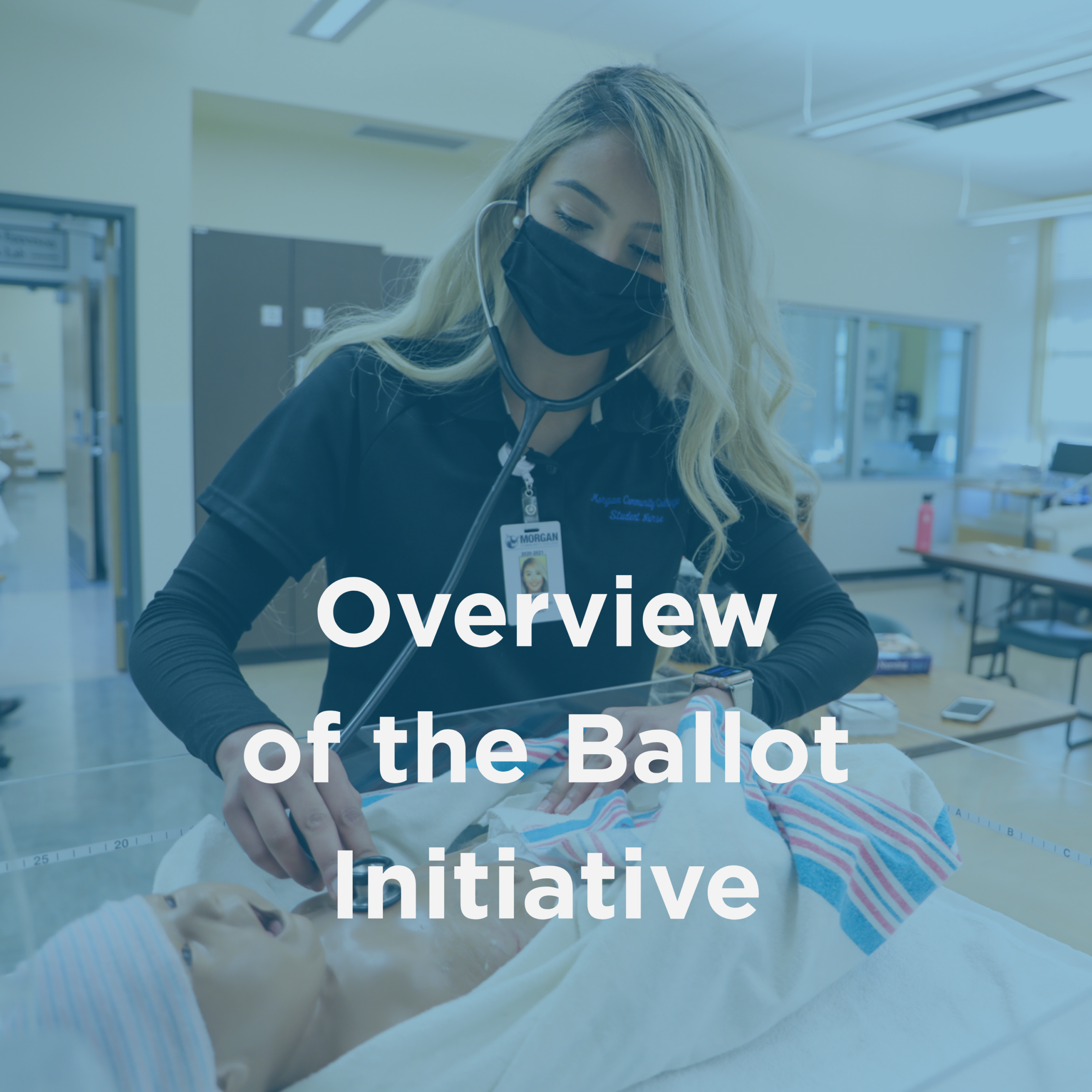Investing in Colorado’s Essential Workforce – Without Raising Taxes
Without raising taxes, this measure creates the Skilled Workers and Trades Fund to provide 5,000 Coloradans every year with tuition-free or low-cost training in the professions our communities rely on most.
- First Responders: Equipping the heroes who keep us safe, like firefighters, paramedics, and EMTs.
- Healthcare: Caring for the people who care for us by training nurses and critical healthcare workers.
- Skilled Trades: Supporting the backbone of our economy by training new electricians, plumbers, welders, machinists, and advanced manufacturing professionals.
- Education: Securing our children’s future by supporting teachers and early childhood educators.
This isn’t just about jobs. It’s about investing in our neighbors who keep Colorado running.
Practical Solutions for Families & the Economy
Colorado’s economy faces a growing mismatch: nearly 75% of jobs require training beyond high school, but high costs keep many Coloradans from getting the credentials they need.
This initiative bridges that gap by:
- Removing financial barriers: This initiative makes it easier for families to achieve financial stability by providing debt-free paths to high-demand careers.
- Supporting local business: By creating a stronger pipeline of skilled talent, it will help local employers fill chronic vacancies and grow.
- Protecting taxpayers: This initiative achieves these goals without raising taxes or creating new government debt.
What Would Voters Be Deciding On?
- Funding the future of work: This measure helps 5,000 Coloradans each year get to work faster by providing scholarships of up to $3,000 for job skills training, helping families achieve financial stability without taking on new debt.
- Permanent, self-sustaining investment without raising taxes: By fully separating Pinnacol Assurance from the state and ending its government subsidies, the initiative generates a one-time $150 million payment to launch the fund and approximately $10 million in recurring annual revenue.
- Accountability and results: Public dollars follow results, not just enrollment. Funding is only reimbursed once learners complete their training, ensuring the investment supports proven outcomes.
Frequently Asked Questions
This initiative creates a permanent, voter-approved Skilled Workers and Trades Fund to support approximately 5,000 Coloradans every year to acquire job skills training for Colorado’s most in-demand jobs, without taking on debt. Without raising taxes, this fund will fill critical workforce gaps, strengthen Colorado’s economy, and help Coloradans more quickly achieve financial stability and contribute to their households and local communities.
No. This initiative does not raise taxes. Instead, the measure allows Pinnacol Assurance, Colorado’s largest workers’ compensation insurer, to operate separately from the state. This would end government subsidies and use that revenue to provide tuition-free skills training for the jobs Colorado needs most.
Nearly three-quarters of jobs in Colorado require education or training beyond high school, yet only about half of working-age adults have a credential. As a result, critical jobs go unfilled and many Coloradans are locked out of opportunity simply because they cannot afford skills training.
The fund prioritizes training for essential, in-demand careers, including:
- Nurses and healthcare workers
- Welders, plumbers, electricians, and other skilled trades
- Teachers and early childhood educators
- Firefighters and public safety professionals
- Emerging technology and tech-enabled trades
The fund supports job skills training that lead directly to employment. Examples include:
- Certified Nursing Assistant (CNA), Licensed Practical Nurse (LPN), and other healthcare certifications
- Electrician, plumbing, welding, HVAC, and carpentry certificates
- Early childhood education credentials and teacher preparation pathways
- Firefighter, EMT, and public safety certifications
- Information technology, cybersecurity, advanced manufacturing, and other technical certificates
Credentials must be aligned with labor-market demand and demonstrate strong completion and employment outcomes.
Eligible providers include education and training organizations with a proven track record of results, such as:
- Community and technical colleges
- Apprenticeship and pre-apprenticeship programs
- Industry associations and labor-management partnerships
- Nonprofit and community-based workforce training providers
- Job training programs at 4-Year universities
All providers must meet clear performance standards, demonstrate alignment with employer demand, and comply with the fund’s pay-for-success requirements.
Funding is available to Colorado residents of any age who have demonstrated financial need and are enrolled in approved, skills training programs. The initiative is designed to support:
- Working adults seeking to upskill, reskill or change careers
- Individuals entering the workforce
- High school and college students participating in pre-apprenticeships, apprenticeships, or credentialing programs
- Parents, caregivers, and others for whom short-term job training is the most practical path to employment
Eligibility is tied to participation in approved training that leads to in-demand jobs, rather than income level alone. This ensures broad access while keeping the focus on outcomes.
Yes. Colorado has a long history of dedicating non-tax revenue from state-created assets to public priorities, including:
- Lottery proceeds to protect parks and open space
- Gaming revenue to support community colleges
- Tobacco settlement funds to expand access to healthcare
- Commercial land-use royalties to build schools in rural areas
This initiative follows that same Colorado-tested approach: pairing a specific revenue source with a clearly defined public benefit. It also builds on proven workforce efforts such as Care Forward Colorado, Career Advance Colorado, Opportunity Now Colorado, and Apprenticeship Colorado—programs that showed strong results when financial barriers to short-term training were removed.
Short-term credentials are the fastest and most affordable path to good jobs, especially for working adults. They help people start earning sooner, avoid unnecessary debt, and meet immediate employer needs.
Yes. In many cases, it covers or significantly offsets the full cost of in-demand credentials. Even when it doesn’t cover 100%, it lowers financial barriers enough to help more people enroll, complete training, and get to work faster.
The fund is business-led and student-centered, governed by employers and workers from Colorado’s most in-demand industries. This ensures training stays aligned with real labor-market needs and remains responsive as Colorado’s economy changes.
This initiative is built on a pay-for-success model:
- Training providers are paid only after a learner completes
- Programs must demonstrate strong employment outcomes
- No completion means no public dollars
Pinnacol will separate entirely from the state, allowing it to operate like other member-owned mutual insurers, pay taxes, and remain regulated by the Colorado Division of Insurance. The ballot measure includes provisions that ensure every Colorado business will continue to have access to workers’ compensation benefits.
As part of that transition:
- Pinnacol makes a one-time, inflation-adjusted $150 million payment reflecting policyholder funds transferred from the state in 2002, and
- Generates ongoing revenue dedicated exclusively to workforce training through the Skilled Workers and Trades Fund.
Existing policies, rates, reserves, and claims remain fully intact.
- The proposed initiative will move through the Title Board process this winter
- Final language will be set following that review
- The measure is proposed for the November 2026 general election ballot
- If approved by voters, implementation would begin following certification and rulemaking
This initiative modernizes a legacy workforce asset, protects workers and employers, respects TABOR, and invests in proven, job skills training, supporting 5,000 Coloradans every year in getting to good jobs without raising taxes or wasting public dollars.



